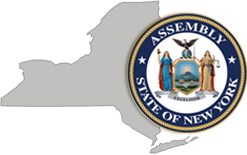Assembly Minority Conference Offers Rules Reforms To Make Assembly Operations More Efficient
The Assembly Minority Conference today introduced 10 proposals designed to strengthen operations in the Assembly Chamber. The measures are aimed at increasing transparency, making operations more equitable and procedures more efficient. Unfortunately, the Assembly Majority Conference rejected the measures during today’s proceedings.
Among the reforms rejected were a requirement to hold a floor vote for any bill that garners at least 76 sponsors, and a bill to guarantee each member of the Assembly the chance to bring one substantive piece of legislation to the floor per two-year term.
Assembly Minority Leader Will Barclay (R,C-Pulaski) expressed his disappointment with the decision to vote down these common-sense reforms to improve operations and bolster transparency in the Assembly Chamber.
“These reforms are designed to promote fairness and ensure the interests of every New Yorker are represented in our House. It is extremely disappointing to see these measures voted down with nearly no debate on the matter,” said Leader Barclay. “Archiving public meetings and giving reporters access to members during legislative proceedings are common-sense ways to protect the public interest and hold our body accountable. Today’s vote was a loss for all New Yorkers, especially the ones who want to better understand the way our government works.
A list of rules reforms proposed by the Assembly Minority is outlined below:
2023 Rules Reforms
- Single Opportunity for Legislative Equality (SOLE) Act - Allow each member of the Legislature, during each two-year term, to bring one substantive piece of legislation of his or her choosing to the floor for a vote (E.226).
- Extended Debate for Budget Bills, Messages of Necessity and Rules Reforms - Make budget bills and bills with “messages of necessity” exceptions to the five-hour debate limit. Make the same exception to the one 15-minute speaking limit. Make Assembly rules reform resolutions exceptions from the 30-minute debate limit (E.218).
- Petition to Convene Session - Establish a petition process for a minimum of 76 members to call the Assembly back to session to address specific matters (E.222).
- Timely Bill Introduction - Require all bills to be assigned a bill number within five business days after being delivered to the index clerk (E.225).
- 2/3 Vote for Messages of Necessity - Require a two-thirds majority vote of the Assembly for “messages of necessity” submitted by the governor to be accepted (E.217).
- Reporter Access - Ensures news reporters have access to the floor during session proceedings (E.223).
- Committee Hearing Petitions - Allow one-third of the members of a committee to petition for a hearing on a bill or an oversight hearing [Under current rules, a majority is required] (E.220).
- Motion to Discharge Reform - Spirit of 76 - Declare a motion to discharge to be in order if the bill or resolution is sponsored by at least 76 members of the Assembly (E.221).
- Archiving Committee Meeting Video - Require committee meeting recordings to be archived on the Assembly website (E.219).
- Committee Bill Removal Prohibition - Prohibit a bill from being removed from a committee agenda once voting on the bill has started (E.224).
